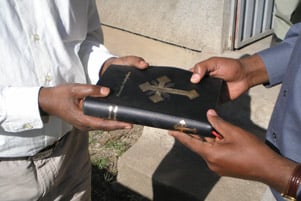
Living Hebrews 13:3
“Remember them that are in bonds, as bound with them; and them
which suffer adversity, as being yourselves also in the body.”
~ Hebrews 13:3 KJV
Kelile understood the challenges of witnessing for Christ in a region predominantly occupied by Muslims. Still, he was surprised when hearing news of a declared jihad (Islamic holy war) by local imams who were opposed to Christianity. Tensions within the community escalated quickly, and Kelile was repeatedly threatened with violence if he did not stop preaching the Gospel. Shaken, but undeterred, he remained steadfast in his faith, refusing to abandon his service to God despite the danger. Kelile found solace in the belief that his life was secure in the Lord’s perfect will.
One night, Kelile and his family were awakened by a loud disturbance outside their home. They hurried downstairs, only to discover that jihadists had broken into their house. Kelile tried to reason with the intruders, but they seized him and pulled him out of the house. At that moment, he understood that these men had intended to follow through on the threats previously received. In an act of faith, he chose not to go quietly but instead shout boldly, "Jesus is Lord!" Kelile's wife and children followed the angry mob, helplessly watching as the militants slashed and beat him with their machetes. When Kelile finally lost consciousness, his attackers cheered, believing he was dead.
After the mob departed, Kelile's family, along with some local villagers, stayed by his side throughout the night, desperately trying to stop the heavy bleeding he sustained from his injuries. They took him to the hospital in the morning, but the doctors explained that there were no further medical options available and instructed them to take Kelile back home. Tragically, he passed away shortly thereafter.

If you are like me, reading accounts of persecution can easily lead to feelings of discouragement. When persecution results in martyrdom, I often wonder why God would allow someone like Kelile to be killed. Why is it that his attackers were able to walk away in the night and bypass the consequences of their actions? And what about Kelile’s aggrieved wife and seven children, who have been left traumatized by such senseless violence? Amidst the questions and tears, the Bible pointed me towards a powerful call to action.
At first glance, Hebrews 13:3 might seem like a passive response to persecution. However, a closer examination of the following words contained within this verse reveals the profound call to REMEMBER…
- “Them that are in bonds [prison], as though bound with them.”
- “And them which suffer adversity [oppression], as being yourselves also in the body.”
The ancient Greek term for the word "bound" means "to bind someone with." The equivalent of this verb in the Hebrew language expounds on this concept by including additional meanings such as "cling," "stick" and "hold." This broader interpretation provides a richer understanding of the word's implications within the context of Hebrews 13:3.
As we encounter the persecution and sufferings of fellow Christians, may we remember that we are connected; that is, we are bound together in Christ. The notion of unity within the body of Christ – His church – unfolds when we take a moment to recognize the deep and meaningful ties that bind us. This connection is not merely superficial. Rather, it is a powerful and unbreakable bond founded on the shared values, beliefs and distinctive characteristics that define us as Christians. We can fully appreciate the richness of our cultural calling as we unite in purpose and spirit, celebrating our shared faith and commitment to Christ with our Christian brothers and sisters.
What is a Christian’s cultural calling? In short, it involves reforming culture within our local spheres of influence regardless of geographical location. Reforming is decisively correcting what is wrong and confidently working towards a better state. Such renewal occurs in families, churches, schools, neighbourhoods, workplaces, professional organizations and civic institutions when the Christian worldview is boldly yet winsomely articulated.
Reforming culture comes at a price, best evidenced today by the persecution of Christians who strive to live godly lives in Christ Jesus. But if this is the work we as disciples of Jesus have in common, then persecution should be a typical, everyday experience for Christians who obey God's will. Even though the level of persecution may vary from region to region, it is evident that the church is called and equipped by God, through His Spirit, to advance regardless of opposition. What persecuted Christians most want during such times is the assurance that they are not alone in God’s mission nor forgotten in their sufferings.
In Tortured for Christ, Richard Wurmbrand wrote that we (those living in “freedom”) must “lead lives of consistent Christianity; lives of sacrifice.”1 In light of this, how should we respond if subjected to persecution? Maybe the better question is: how much are we willing to sacrifice to live for Christ? When considering the sufferings of faithful witnesses of Christ throughout church history and this present day, the question should no longer be about justice for the oppressed because we know that God is a righteous Judge who defends those who are His. Rather, we must ask ourselves whether we would likewise honour Christ in our bodies, whether by life or by death.2
I hope and pray that the kindness and compassion of our loving Saviour will fill you with a deeper awareness of His incredible grace and boundless peace.
![]()
Floyd A. Brobbel
Chief Executive Officer
Voice of the Martyrs Canada Inc.
Endnotes:
1 Wurmbrand, Richard. Tortured for Christ: 50th Anniversary Edition. Cook, 2017. p. 163.
2 Philippians 1:20 ESV


